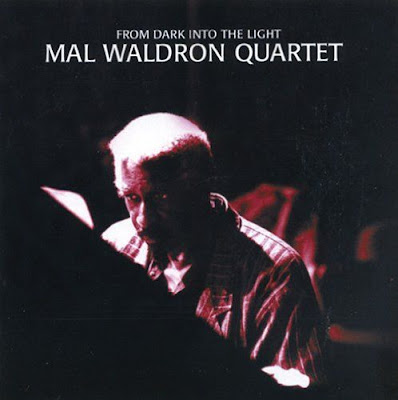Record date: somewhere in 1967
This really was one of the most pleasant discoveries I made in my quest for collecting all of Mal Waldron’s records. To be honest: I really kept this one as one of my last purchases for I did not expected much of it. I mostly bought it to complete the collection. I was pretty wrong about it for there is some excellent music on this disc.
Mal’s affiliation with Embryo was a life long one and that came mostly trough his friendship with vibist Christian Burchard. Burchard already lived in Munich in 1966 and played with some of the American jazz residents who lived there or stayed there for a long time. The southern German city had a pretty lively jazz scene with residents like Pony Pointdexter, Carmell Jones, Benny Bailey and later of course: Mal Waldron. At one night Mal was playing at the Domicile club and Burchard joined in. From that moment they were to become livelong friends. I am not sure if the artist on the cover really should have been Embryo as Burchard states in the liner notes that the German krautrock group was formed later. But this definitely was it’s birth. As Burchard stated: ‘This is an example how we sounded before the Embryo project was founded’. The music is more jazz oriented and rock influences are nearly absent. Mal did not record a lot of stuff in 1967 but he sure was not inactive. He was already gigging all across Europe and mostly in Germany.
Mal doesn’t play on all of the songs. The first two compositions are without him but are both very interesting. ‘Sugar Lump’ is a very good tribute to one of jazz forgotten vibraphone wonders: Walt Dickerson. It breathes the same air as his music and his influence is evident on Burchard’s playing. The music has some kind of free atmosphere as both bassist Gewissler and drummer Serfas are moving away from more traditional jazz patterns. They sound pretty advanced to me and are surprisingly original in their sound. Burchard himself utilizes the given space in an excellent way interacting with both his band mates and not losing himself in a technical show off.
Unfortunately the sound quality of the Waldron selections is not as good as the first two songs. But this is a fascinating look into the music Mal made in those years. Just like his 1966 records you could hear he’s really trying to create his own sound experimenting with loops, repetition and percussive playing. He’s not yet the pianist he was to become in the years after but you could really hear those roots here. Also there’s a very first recording of his ‘Blood and Guts’ composition: it’s titled Anka’s Trance here. It’s the only track that does not really work out that well as it sounds there are some miscommunications in the group. The other tracks are excellent. Some have a more traditional jazz sound but it’s mostly a little more advanced than that. Mal listened a lot to what was going on at the American freejazz scéne at the time. And although his music never became that free, he was seriously influenced by it. He swings insanely hard on ‘Bud Study’, a composition that is very Waldronesque but has this Bud Powell feeling over it. He show’s his more sentimental side on ‘For Bob’ and revisits his classic ‘Fire Waltz’ for the first time.
Disconforme is one of those public domain labels. I really dislike them for they do not pay any royalties to the one’s who the music belong to. But also they push the regular labels out of business with their subpar but cheap products. As this disc was compiled by Christian Burchard himself (he also wrote the liner notes) I could live with it. The liner’s and photographs are very nice so it’s really worth having. The sound quality differs really by session. Some of them are surprisingly good but track 3,4 and 5 do not sound so good. But it’s definitely acceptable. I could imagine hardcore ‘Embryo’ lovers will not be impressed by the music presented here. But for those interested in Burchard’s more jazzy side, this is interesting stuff!
























